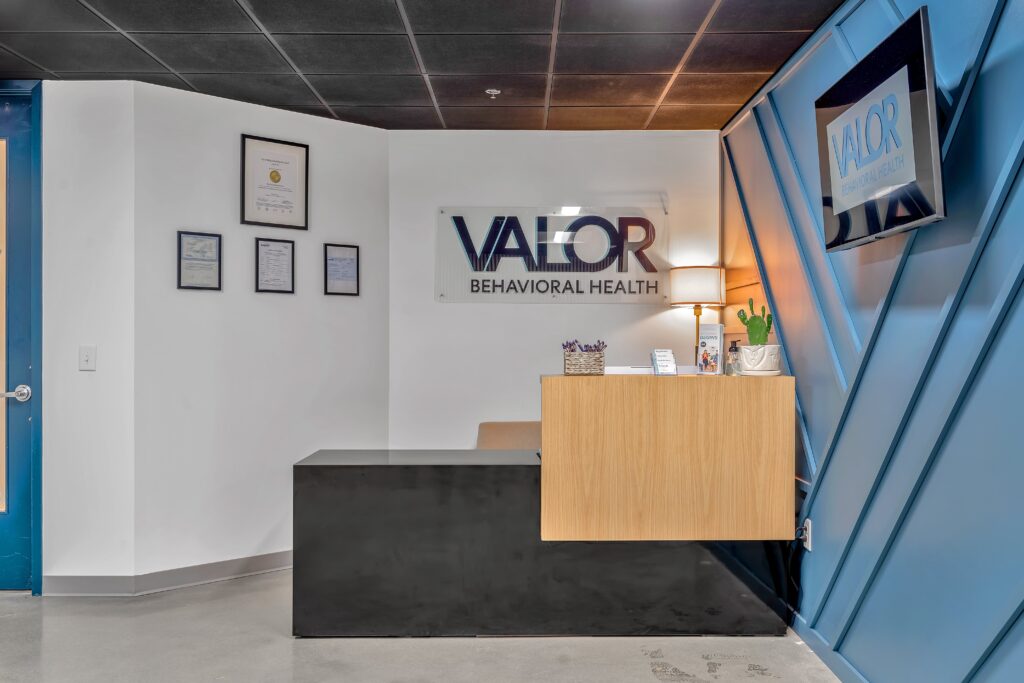
Mental Health Programs in Atlanta
At Valor Behavioral Health, our team aims to offer the best Mental Health Programs in Atlanta. Providing personalized therapy, several clinical modalities that include Acceptance Commitment Therapy, Cognitive Behavioral Therapy (CBT), Dialectical Behavior Therapy (DBT), Resilience Building, Narrative Therapies, and concepts that promote Strength, Solution, and Resolution.
If you or a loved one is struggling with a mental health disorder, call us now at 866-859-3442 or verify your insurance now.
Mental Health Programs in Atlanta
Our mental health program help clients bridge the gap from residential treatment acclimate back to the real world. If clients did not attend mental health treatment prior to coming to us, our programs can also offer great flexibility for those who need to continue working or going to school.

Partial Hospitalization Program (PHP)
At Valor Behavioral Health, our Partial Hospitalization Program (PHP) in Atlanta, Georgia offers an outpatient treatment program for individuals experiencing mental health or substance abuse issues. By providing a vital bridge between inpatient care and outpatient services, our PHP Program is designed for individuals who require intensive support but do not need round-the-clock hospitalization.
Intensive Outpatient Program
Intensive Outpatient Program (IOP) offers a flexible mental health and substance abuse treatment program. It’s designed for individuals seeking recovery while maintaining a daily routine. IOPs are ideal for individuals transitioning from inpatient care or those who require more support than traditional outpatient services offer.


Outpatient Mental Health Rehab
We pride ourselves on staying ahead of the curve with innovative therapeutic treatment alternatives. Our Outpatient Mental Health Rehab Program provides personalized mental health and substance abuse treatment. Valor Behavioral Health is designed for individuals seeking recovery while balancing their daily commitments.
Adolescent Programming
Our adolescent programming offers a post-traumatic growth model where adolescents can find the proper care and guidance needed to understand their mental health disorders and thrive.

Mental Health Disorders We Treat

Dual Diagnosis
Dual Diagnosis is the term to describe people who have both a mental disorder and an alcohol or drug problem. These circumstances occur repeatedly, and the patient must treat both conditions appropriately.

Depression
Depression is a mental health mood disorder that causes a persistent feeling of sadness or loss of interest in activities. It affects how you feel, think, and behave, causing significant impairment in daily life.

Addiction
Addiction is a neuropsychological disorder in which the individual has a compulsive, chronic, physiological, or psychological need for a habit-forming substance, behavior, or activity. In most cases, the outcome will have harmful psychological, physical, or social effects and cause unpleasant symptoms upon withdrawal or abstinence.

Emotional Trauma
Emotional trauma is the result of experiences or events that leave a person feeling profoundly unsafe and vulnerable. It can occur from an isolated event or an ongoing occurrence.

Borderline Personality Disorder
Within the general population, approximately 1.6% of people have borderline personality disorder.
What To Expect In Mental Health Treatment
Entering mental health treatment can be a daunting experience, especially if you’ve never been to therapy before. It’s normal to feel anxious or uncertain about what to expect in treatment. However, at Valor Behavioral Health, we strive to make the treatment process as comfortable and supportive as possible.
Here’s what you can expect when you seek mental health treatment at Valor Behavioral Health:
- A Comprehensive Assessment : The first step in treatment is a comprehensive assessment with one of our licensed clinicians. This assessment is designed to help us understand your unique needs and goals and to develop a personalized treatment plan that addresses them. We will ask you questions about your mental health history, current symptoms, and any other factors that may be impacting your well-being.
- Evidence-Based Treatment : At Valor Behavioral Health, we believe in providing our patients with evidence-based treatment options that are backed by scientific research. This means that we use treatments that have been proven to be effective in treating a wide range of mental health issues. Our therapists are trained in a variety of evidence-based treatment modalities, including cognitive-behavioral therapy, dialectical behavior therapy, holistic therapy, somatic therapy, and Eye Movement Desensitization and Reprocessing (EMDR), among others.
- Individualized Treatment Plans : At Valor Behavioral Health, we understand that every individual is unique and requires a personalized treatment plan that addresses their specific needs and goals. That’s why we work with our patients to develop an individualized treatment plan that is tailored to their unique circumstances. Your treatment plan may include a combination of therapy, medication management, and other supportive services, depending on your specific needs.
- Compassionate and Supportive Care : At Valor Behavioral Health, we are committed to providing our patients with compassionate and supportive care throughout the treatment process. Our therapists are dedicated to creating a safe and non-judgmental space where individuals can work through their challenges and make meaningful progress toward their goals.
We believe that everyone deserves access to high-quality behavioral health treatment, and we strive to provide our patients with the highest level of care and support.

Learn More About Our Mental Health Programs in Atlanta
Valor Behavioral Health offers extensive levels of care for those individuals looking to improve their mental health and well-being. We are fully committed to helping our clients reclaim their best selves by improving their quality of life with better mental health. Reach out today to start your journey to a happier and healthier life!








